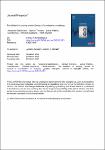Poo Matters! A scoping review of the impact of constipation on epilepsy
| dc.contributor.author | Gabrielsson, A | |
| dc.contributor.author | Tromans, S | |
| dc.contributor.author | Watkins, L | |
| dc.contributor.author | Burrows, L | |
| dc.contributor.author | Laugharne, R | |
| dc.contributor.author | Shankar, Rohit | |
| dc.date.accessioned | 2023-07-31T09:37:15Z | |
| dc.date.available | 2023-07-31T09:37:15Z | |
| dc.date.issued | 2023-05 | |
| dc.identifier.issn | 1059-1311 | |
| dc.identifier.issn | 1532-2688 | |
| dc.identifier.uri | https://pearl.plymouth.ac.uk/handle/10026.1/21090 | |
| dc.description.abstract |
BACKGROUND: Epilepsy is a common neurological disorder which frequently presents with co-morbid physical health conditions, including constipation. However, the nature of the relationship between the two conditions has not been well defined. AIM: To quantify constipation's relationship with epilepsy and anti-seizure medication (ASM). METHOD: A scoping review registered on PROSPERO (CRD42022320079) with suitable search terms was conducted and reported in accordance with PRISMA guidance. CINAHL, Embase, PsycInfo and MEDLINE electronic databases were searched by an information specialist. The Joanna Briggs Institute (JBI) critical appraisal tools alongside the Oxford Centre for Evidence Based Medicine (OCEBM) levels of evidence were used to assist in assessing relevance, quality, and results of the included publications. RESULTS: Nine articles selected for inclusion in the review. The prevalence of irritable bowel syndrome (including constipation) was reported to be up to five times more frequent in people with epilepsy (PWE). Functional constipation was reported in 36% of PWE. Constipation was found to be the second most common co-morbid condition in children with epilepsy. Two studies found constipation to precede seizures. Constipation was reported as a common side effect of ASMs in PWE. Two studies rated OCEBM level 2 the remaining level 3. CONCLUSION: Our findings suggest a higher prevalence of constipation in PWE. Co-occurring multimorbidity and resulting polypharmacy adds further complexity to the process of establishing aetiology of constipation in PWE. Potential contributory aetiological factors for constipation such as neurodevelopmental and genetic disorders, ASM side effects and the epilepsy itself require better understanding and research. | |
| dc.format.extent | 127-136 | |
| dc.format.medium | Print-Electronic | |
| dc.language | en | |
| dc.publisher | Elsevier BV | |
| dc.subject | Seizures | |
| dc.subject | Intestinal movement | |
| dc.subject | Irritable bowel syndrome | |
| dc.subject | Functional gastrointestinal disorder | |
| dc.title | Poo Matters! A scoping review of the impact of constipation on epilepsy | |
| dc.type | journal-article | |
| dc.type | Journal Article | |
| dc.type | Review | |
| plymouth.author-url | https://www.webofscience.com/api/gateway?GWVersion=2&SrcApp=PARTNER_APP&SrcAuth=LinksAMR&KeyUT=WOS:000990589600001&DestLinkType=FullRecord&DestApp=ALL_WOS&UsrCustomerID=11bb513d99f797142bcfeffcc58ea008 | |
| plymouth.volume | 108 | |
| plymouth.publication-status | Published | |
| plymouth.journal | Seizure | |
| dc.identifier.doi | 10.1016/j.seizure.2023.03.023 | |
| plymouth.organisational-group | |Plymouth | |
| plymouth.organisational-group | |Plymouth|Faculty of Health | |
| plymouth.organisational-group | |Plymouth|Users by role | |
| dc.publisher.place | England | |
| dcterms.dateAccepted | 2023-03-28 | |
| dc.date.updated | 2023-07-31T09:37:09Z | |
| dc.rights.embargodate | 2023-8-1 | |
| dc.identifier.eissn | 1532-2688 | |
| rioxxterms.versionofrecord | 10.1016/j.seizure.2023.03.023 |


